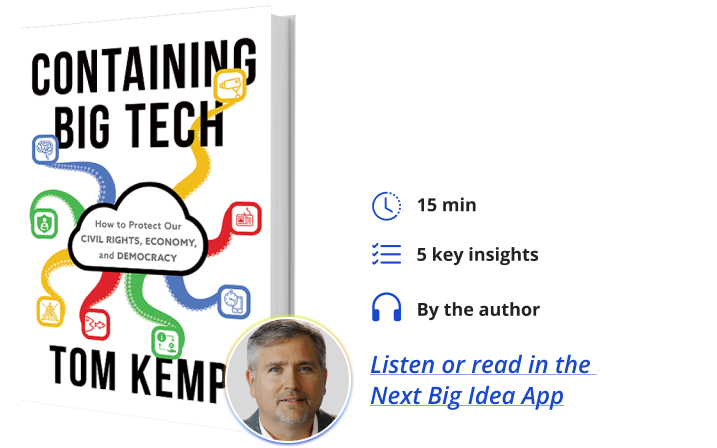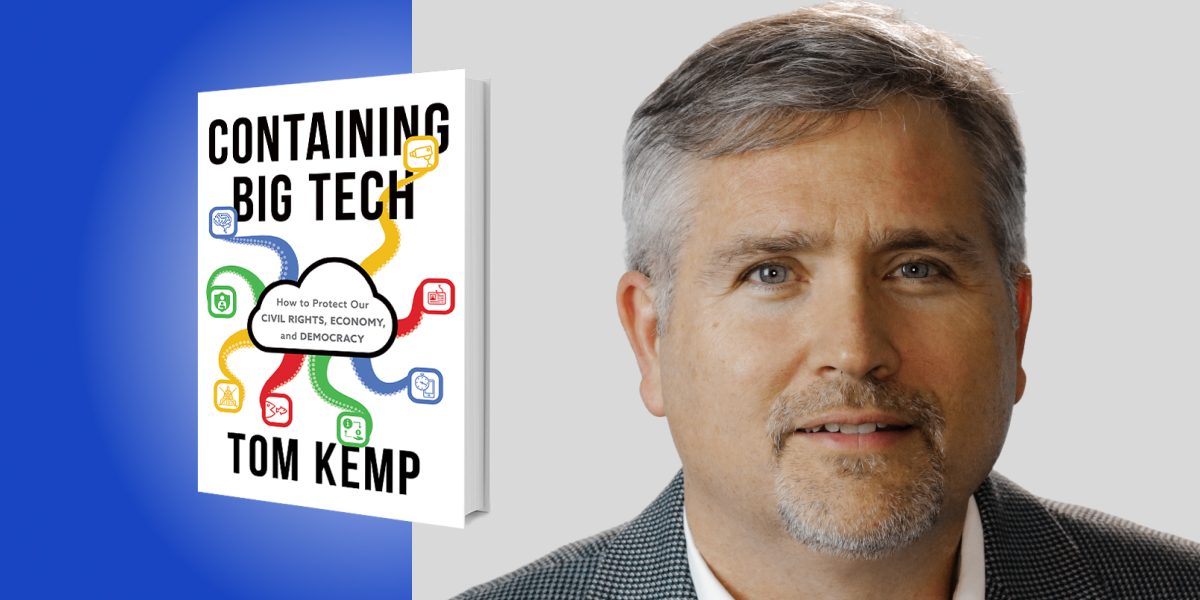Tom Kemp is a Silicon Valley-based entrepreneur, investor, and policy advisor who founded Centrify, a leading cybersecurity cloud provider. Tom writes extensively on technology policy and has served as a technology policy advisor for political campaigns and advocacy groups. His expertise in cybersecurity and privacy has been featured in The Guardian, Politico, The Washington Post, CNBC, Fox News, and others.
Below, Tom shares five key insights from his new book, Containing Big Tech: How to Protect Our Civil Rights, Economy, and Democracy. Listen to the audio version—read by Tom himself—in the Next Big Idea App.

1. The collection of our personal data is increasingly being weaponized against us.
The five big tech companies—Meta, Apple, Amazon, Microsoft, and Google—have built innovative products that improve many aspects of our lives. However, their intrusiveness and our dependence on them have created pressing threats to our civil rights, economy, and democracy.
It all starts with their business model. Many big tech firms’ business models are based on collecting massive amounts of information about every one of us to sell for online advertising. This collected information is in the form of “data exhaust” that we emit as we interact with the internet through websites, mobile apps, and internet-connected devices. Just as gas-powered cars emit carbon exhaust, we emit digital exhaust in the form of data.
This mass collection and monetization of our data by companies like Google and Meta mean they know more about our behavior, our precise location, internet searches, purchases, and apps, than our friends and family. Historically, this near-total digital surveillance has enabled those companies to profile us and utilize this deep insight to let advertisers target us. Now, however, this data and behavioral analysis can be weaponized against us. An example would be if you facilitate or get an abortion in certain U.S. states, or if the data gets into the wrong hands like adversarial nation-states who then use it to attack our democracy.
2. Over-collection of our personal data is causing an increase in identity theft cases.
One of the most significant issues associated with the over-collection of our data is the increased number of incidents of identity theft. The Federal Trade Commission recorded over 1.4 million identity theft cases in 2021, compared to 650,000 in 2019; a doubling in two years. According to the Identity Theft Resource Center (ITRC), identity theft can “destroy a person’s credit, make it difficult to get housing, and, in some cases, drive people to contemplate suicide.” A recent survey by ITRC found that 67 percent of respondents said they could not pay their bills because of identity theft.
“The Federal Trade Commission recorded over 1.4 million identity theft cases in 2021, compared to 650,000 in 2019.”
If less data about us is collected and stored by Big Tech, and other firms such as data brokers, less data can be breached. There should be a comprehensive privacy law that can empower us to say no to companies that demand too much of our data.
3. Artificial Intelligence (AI) can be, and is being, used for exploitative purposes.
The CEO of Google, Sundar Pichal, said that AI is the “most profound technology that humanity is currently working on.” Not surprisingly, Big Tech is investing billions of dollars in AI; it is commonplace in Big Tech’s services and can deliver significant value to consumers and Big Tech’s customers. For example, AI allows Big Tech’s virtual assistants like Apple’s Siri and Amazon’s Alexa to interpret questions, provide recommendations, or even perform tasks such as playing music, making a phone call, or sending a calendar invite.
Despite the positives, AI can introduce bias or be misused by Big Tech. For example, Meta utilizes AI to maximize user engagement on their platforms. In doing so, critics claim that their AI-based recommendation systems can promote content that favors controversy, disinformation, and extremism, and that this has led to users becoming measurably more polarized. Even considering this, Big Tech is placing significant bets on AI.
In light of Big Tech’s growing use of AI, we have to examine the threats associated with it. Specifically, we need to assess how bias can seep into AI and introduce unfair outcomes for certain groups of people. We as a society must better regulate and contain AI and make sure it is not used in exploitative ways.
4. We have a significant problem with kids’ online safety.
In the fall of 2021, reporters with the Wall Street Journal decided to experiment and see what it would be like to experience TikTok as children aged 13 to 15. Unfortunately, the reporters soon discovered that TikTok’s underlying AI systems drove the minors’ accounts into rabbit holes of endless spools of adult content. Collectively, the accounts saw over one hundred videos recommending pornography sites, plus other videos encouraging drinking and drug use.
“Kids find it even more challenging to resist staying online because they lack critical cognitive capabilities.”
Social media should not create rabbit holes for us to fall into, let alone ones as explicitly dangerous as these. While adults may be able to navigate around or climb out of these rabbit holes, it is much harder for kids, primarily because our brains typically don’t fully mature until we are in our mid-twenties. Moreover, kids find it even more challenging to resist staying online because they lack critical cognitive capabilities.
You could argue that the best way forward to protect kids online is to avoid having kids use technology. However, in today’s modern age, that is not practical or possible, given the reality that the digital world is a necessary and significant part of our kids’ lives. To prepare young people for a world in which AI will automate many jobs, we need kids to be tech literate and savvy, whilst also remaining safe and resisting addiction.
5. Big Tech’s use of digital surveillance and AI is causing problems.
The fact is that the Big Tech firms have monopolistic power over key digital markets in our economy. The end result is that we are seeing suppressed competition and innovation.
All Big Tech firms have been aggressively acquiring or stifling competitors. Furthermore, Big Tech continues to gain a competitive advantage as they get more widely used. Known as “network effects,” this means that as they gain more users and their platforms become more compelling and valuable. Sticky network effects can be leveraged for anti-competitive behavior.
“Having such high degrees of concentration is not healthy for our economy or democracy.”
For example, Big Tech has been accused of purposely not making its products interoperable with alternative solutions. This locks in consumers, because if they move from Big Tech’s products, they lose the ability to communicate and socialize with friends who are still on those platforms. Critics say that Big Tech firms unfairly use their knowledge of which third-party solutions are trending with consumers in their marketplace or app stores, and then will turn around and offer knock-off versions.
As much as we may like their brands or fondly recall how they started as scrappy start-ups and the darlings of Silicon Valley, having such high degrees of concentration is not healthy for our economy or democracy. Justice Louis Brandeis wrote over a century ago, “We must make our choice. We may have democracy, or we may have wealth concentrated in the hands of a few, but we cannot have both.” Big Tech firms’ market dominance has impacted entrepreneurship and innovation, weakened privacy, as well as undermined journalism and a vibrant press.
To listen to the audio version read by author Tom Kemp, download the Next Big Idea App today:































